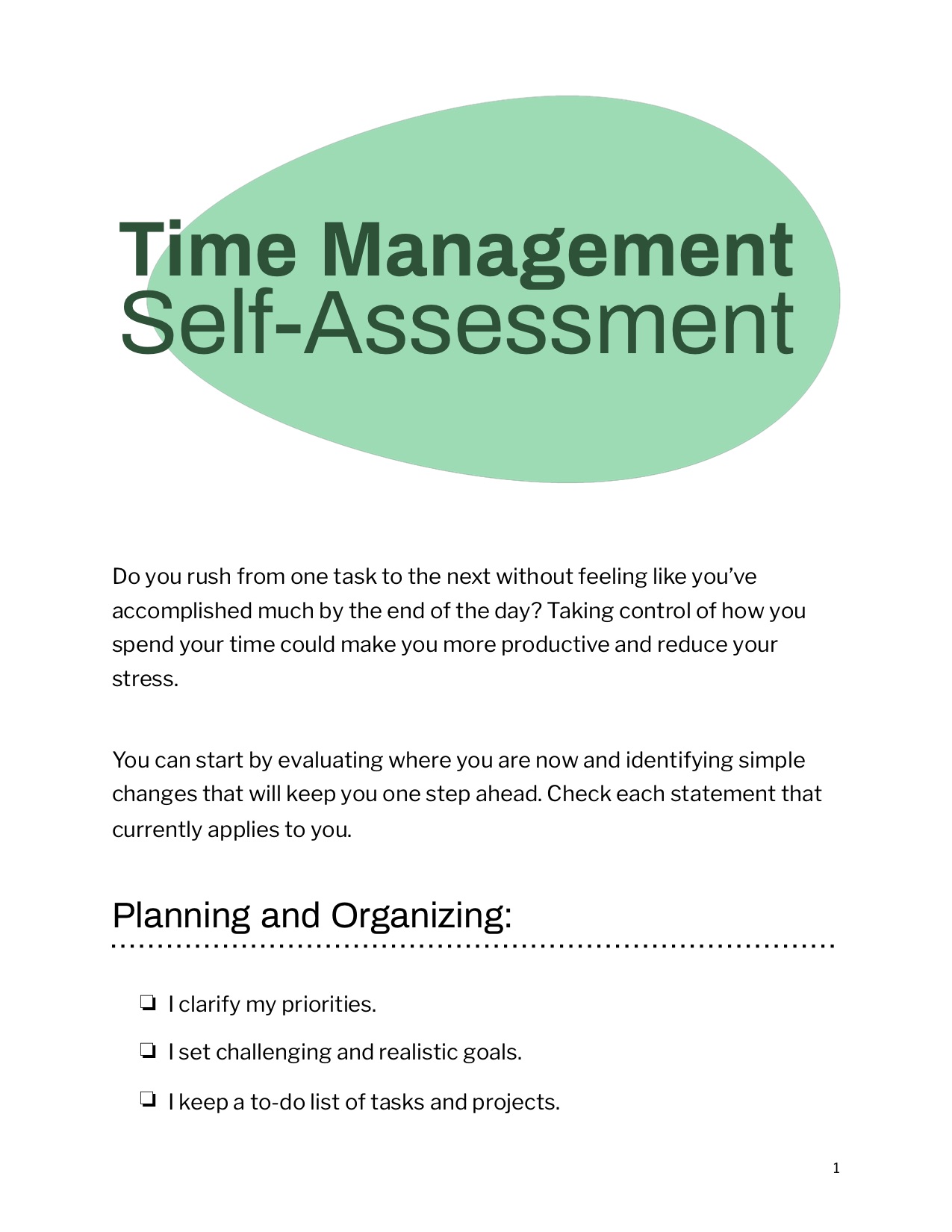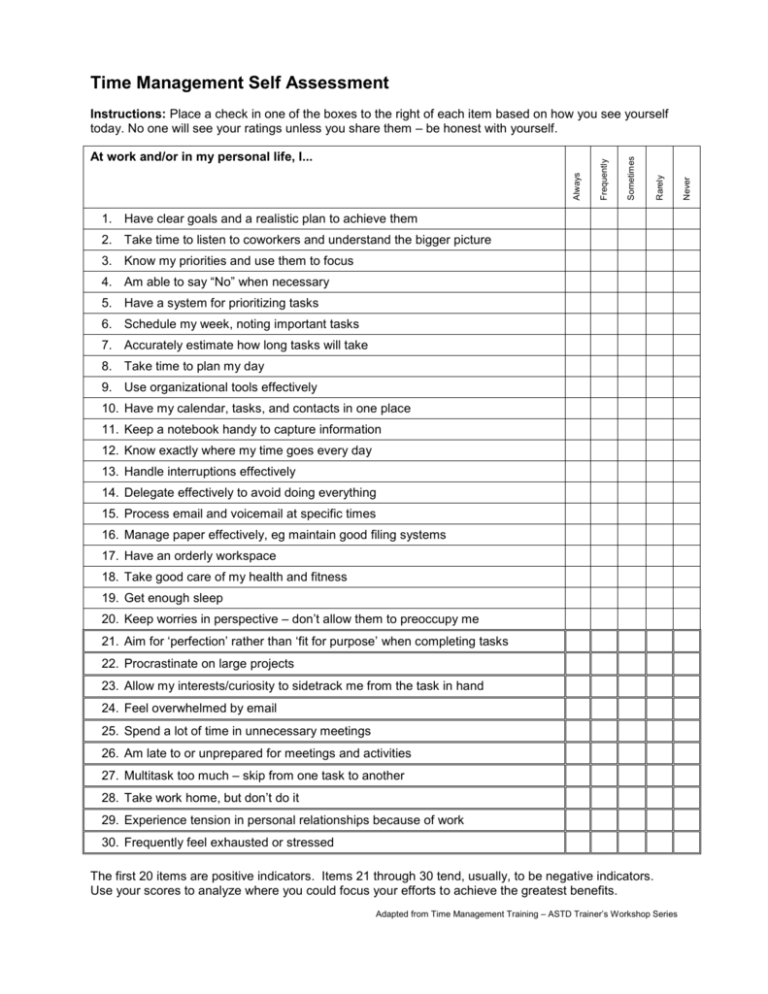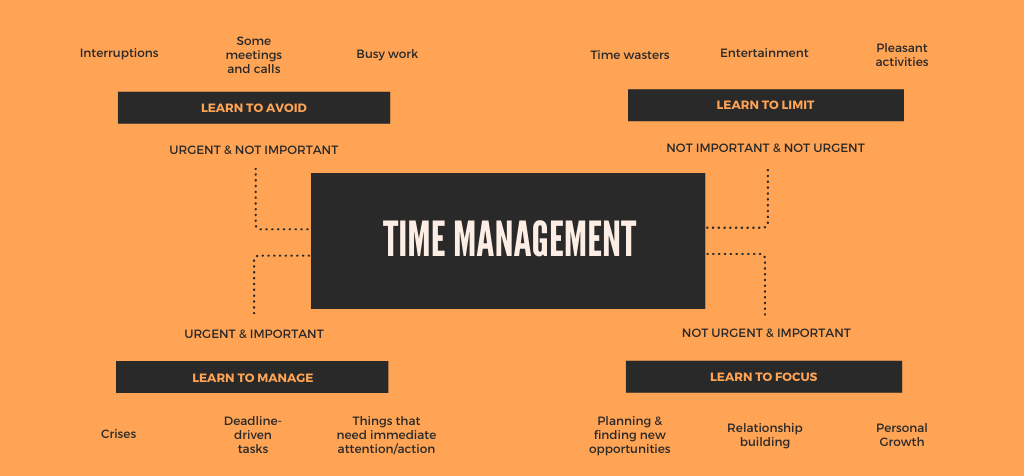Time Management Assessment
Time management is an essential skill in today’s fast-paced world. Efficiently managing your time allows you to accomplish more in less time, helping you reach your goals and enhance productivity. Moreover, effective time management can reduce stress and improve your overall quality of life.
To assess your current time management skills, it’s essential to evaluate how you spend your time. Here are some key questions to ask yourself:
1. What are your top priorities? Understanding your priorities is vital when it comes to managing your time. Identifying tasks and activities that are most important to you helps you allocate your time more effectively and ensures you are working towards your goals.
2. How do you handle distractions? Distractions can be a major hindrance to efficient time management. It’s crucial to be aware of what distracts you and develop strategies to minimize or eliminate these distractions. By doing so, you eliminate wasted time and improve your focus and productivity.
3. Are you proactive or reactive? Proactive time management involves taking charge of your schedule and making intentional decisions about how you spend your time. On the other hand, reactive time management involves responding to external demands and letting others dictate your schedule. Being proactive allows you to prioritize tasks and allocate your time more effectively.
4. How do you plan your day? Planning your day ahead of time is a key component of effective time management. With a clear plan in place, you eliminate indecisiveness and uncertainty and can work on your tasks more efficiently. Take into account your peak productivity times and allocate focused time for important tasks.
5. Do you delegate tasks? Delegating tasks that can be done by others is an important time management strategy. By effectively delegating tasks, you free up time for more important responsibilities and reduce your workload. However, it’s essential to choose the right people for the job and clearly communicate expectations.
By assessing your time management skills and identifying areas for improvement, you can take steps to enhance your efficiency and effectiveness. With these factors in mind, you can optimize your time, increase your productivity, and achieve your goals. So, if you are looking to make the most of your time, start by evaluating your current time management practices.

Welcome, eager learners! Are you tired of feeling like there aren’t enough hours in the day? Do you find yourself constantly overwhelmed by endless to-do lists and distractions? Well, fear not because today I am here to introduce you to a powerful tool that will revolutionize how you manage your time. Say hello to the Time Management Assessment!
Now, you may be wondering, what is a Time Management Assessment and how can it help me? Simply put, it is a valuable resource that allows you to identify your time management strengths and weaknesses. It is a comprehensive evaluation that provides insights into your habits and behaviors that may be affecting your productivity.
Taking this assessment will help you understand how you manage time and identify areas for improvement. Armed with this knowledge, you can make targeted changes to your routines, regain control of your time, and achieve your goals more efficiently. Imagine a life where your to-do list is no longer overwhelming. Picture yourself prioritizing tasks, staying focused, and accomplishing more in less time. This assessment can turn that dream into your reality.
Fellow time warriors, join me on this journey of self-discovery and transformation to take charge of your schedule and maximize every minute. Strap on your seatbelts and become a time management ninja. Your future self will thank you!
Time Management Assessment
Effective time management is crucial for achieving personal and professional success. However, understanding how to manage one’s time can be challenging. Time management assessments can be helpful.
A time management assessment is a tool that allows individuals to evaluate how they manage their time and identify areas for improvement. It involves self-reflection and analysis of one’s routines, habits, and priorities. By completing a time management assessment, individuals can gain insights into how they spend their time and make necessary adjustments to maximize productivity.
During a time management assessment, individuals evaluate how they allocate their time to tasks and activities. This involves rating the importance and urgency of tasks, identifying time wasters, and determining which activities contribute most to goals. This helps individuals identify areas where they may spend too much or too little time and make informed decisions about how to prioritize activities.
A time management assessment can highlight common challenges individuals face when managing their time, helping them identify behaviors that hinder productivity. These obstacles can include procrastination, lack of planning, or difficulty with delegation. Recognizing these challenges allows individuals to develop strategies and overcome them, leading to improved time management skills.
In summary, a time management assessment is a valuable tool for enhancing time management skills. It provides a clear understanding of current practices and areas for improvement, empowering individuals to make changes that increase productivity and reduce stress for overall success.
Overview
In the world of productivity and efficiency, time management is crucial. It involves planning and organizing how to divide your time between activities. Effective time management helps individuals achieve goals, reduce stress, and increase productivity.
A time management assessment allows individuals to evaluate their skills and identify areas for improvement. It typically involves a questionnaire that assesses the ability to prioritize tasks, set goals, manage distractions, and allocate time efficiently.
One way to assess time management skills is through the use of a time management matrix. This matrix, popularized by Stephen R. Covey in his book “The 7 Habits of Highly Effective People,” categorizes tasks into four quadrants: important and urgent, important but not urgent, urgent but not important, and not urgent and not important. By evaluating tasks based on these quadrants, individuals can prioritize their activities and focus on the ones that are most important and time-sensitive.
Here is an example of a time management matrix:
Quadrant: Tasks
Important and Urgent: Deadline-driven work, emergencies
Important but Not Urgent: Long-term planning, goal setting
Urgent but Not Important: Interruptions, distractions.
Not Urgent and Not Important: Time-wasting activities, excessive use of social media.
By utilizing this matrix, people can visually assess how they currently spend their time and subsequently adjust their time allocations. This assessment serves as a useful tool for enhancing time management skills and boosting productivity.
Key Features or Points
The time management assessment evaluates an individual’s ability to effectively manage and prioritize tasks.
It helps identify strengths and weaknesses, allowing for necessary improvements.
The assessment consists of questions or scenarios to evaluate current practices and provide feedback.
Exercises or tasks may simulate real-life situations to assess planning, organizing, and allocating time efficiently.
– The assessment provides insights into an individual’s time management skills, such as goal setting, managing distractions, delegating tasks, and staying organized.
– It helps individuals understand the impact of their time management habits on productivity and work-life balance.
– The results can be used to develop personalized strategies for improving time management skills.
– Time management assessments are used in professional development workshops, performance evaluations, and education settings.
– They benefit individuals who struggle with procrastination, lack of focus, or feeling overwhelmed by their workload.
The time management assessment is a valuable tool for individuals who want to enhance productivity and achieve their goals more efficiently.
Practical Tips or Strategies

When it comes to time management, practical tips can greatly improve productivity. Prioritizing tasks is important. By defining and organizing tasks according to urgency and importance, individuals can focus on critical responsibilities.
Setting realistic goals and deadlines is another helpful tip. It is important to be aware of one’s capabilities and limitations, establishing achievable targets. Breaking larger tasks into smaller, manageable chunks allows for clearer focus and reduces overwhelm.
Time blocking is an effective strategy that involves scheduling specific blocks of time for different tasks. This creates structure and prevents time from being wasted on unimportant tasks.
Additionally, minimizing distractions is important. This includes turning off notifications, closing unnecessary tabs and apps, and finding a quiet space to work. Creating a focused environment optimizes productivity and improves task completion efficiency.
It is essential to take breaks and practice self-care. Regular breaks refresh the mind and prevent burnout. Physical activity, mindfulness, and enough sleep maintain well-being and ensure optimal time management. Implementing practical tips and strategies enhances time management skills and promotes success in personal and professional lives.
Personal Perspective or Case Study

As a busy college student, I have faced challenges in managing my time effectively. With a heavy course load, extracurricular activities, and a part-time job, finding balance can be difficult. However, through trial and error, I have learned valuable lessons in time management.
One strategy that has worked well for me is creating a detailed schedule. I use a planner to map out my activities, assignments, and deadlines. This allows me to prioritize my tasks efficiently by allocating specific time slots for studying, attending classes, and other activities.
Another important aspect of time management is avoiding distractions. It is easy to get sidetracked by social media, texting, or procrastination. To combat this, I set boundaries and designate specific times for focusing on my work. This helps me stay on track and allows for breaks and personal time.
Related Resources

Congratulations on completing the time management assessment and gaining valuable insights into your approach! Reflecting and considering your answers is an important step towards improving your ability to manage time effectively.
Now, it’s time to take action and apply these insights to your life. Here are some resources that can help you further develop your time management skills:
– Time Management Books: Explore popular titles like “The 7 Habits of Highly Effective People” by Stephen R. Covey or “Getting Things Done” by David Allen. These books offer practical strategies and tips.
Utilize these resources to enhance your time management skills and make positive changes in your life.
Online Courses: Enroll in online courses focusing on time management. Platforms like Coursera, Udemy, or LinkedIn Learning provide a diverse range of courses to refine your time management techniques and develop new habits.
Productivity Apps: Explore productivity apps such as Todoist, Trello, or Asana. These apps offer tools to help you organize tasks, set priorities, and stay on track with your goals.
Reflect on how these resources align with your goals and challenges. Consider which ones resonate most with you and commit to exploring them further. Remember, improving time management is an ongoing process that requires dedication and practice.
Now that you have the knowledge and resources, take action and make a positive change. Embrace the opportunity to become more efficient in your daily life. The power to manage time effectively lies within you.
So, what are you waiting for? Start your journey towards better time management today!
